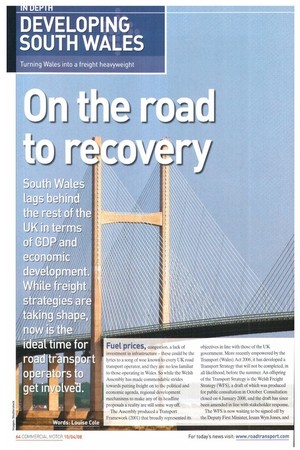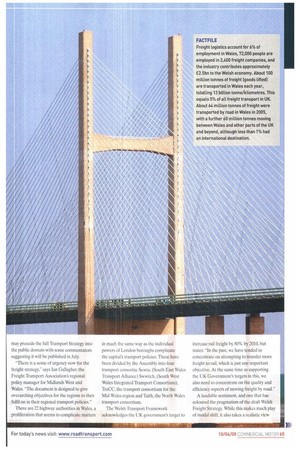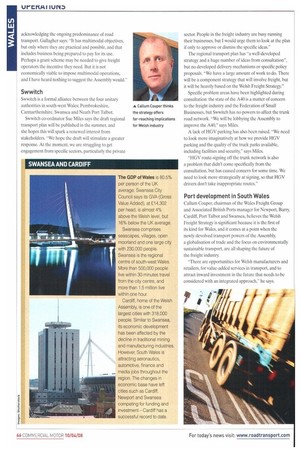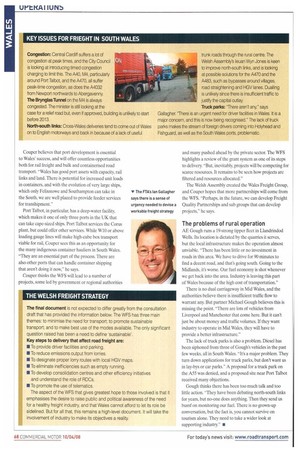On the road recov
Page 64

Page 65

Page 66

Page 68

If you've noticed an error in this article please click here to report it so we can fix it.
Fuel prices, congestion, a lack of investment in infrastructure — these could be the lyrics to a song of woe known to every UK road transport operator, and they are no less familiar to those operating in Wales. So while the Welsh Assembly has made commendable strides towards putting freight on to the political and economic agenda, regional development mechanisms to make any of its headline proposals a reality are still some way off.
The Assembly produced a Transport Framework (2001) that broadly represented its objectives in line with those of the UK government. More recently empowered by the Transport (Wales) Act 2006, it has developed a Transport Strategy that will not be completed, in all likelihood, before the summer. An offspring of the Transport Strategy is the Welsh Freight Strategy (WFS), a draft of which was produced for public consultation in October. Consultation closed on 4 January 2008, and the draft has since been amended in line with stakeholder response.
The WFS is now waiting to be signed off by the Deputy First Minister, Ieuan Wyn Jones, and may precede the full Transport Strategy into the public domain with some commentators suggesting it will be published in July.
"There is a sense of urgency now for the freight strategy," says Ian Gallagher, the Freight Transport Association's regional policy manager for Midlands West and Wales. "The document is designed to give overarching objectives for the regions to then fulfil on in their regional transport policies."
There are 22 highway authorities in Wales, a proliferation that seems to complicate matters in much the same way as the individual powers of London boroughs complicate the capital's transport policies. These have been divided by the Assembly into four transport consortia: Sewta, (South East Wales Transport Alliance) Swwitch, (South West Wales Integrated Transport Consortium), TraCC, the transport consortium for the Mid Wales region and Taith, the North Wales transport consortium.
The Welsh Transport Framework acknowledges the UK government's target to increase rail freight by 80% by 2010, but states: "In the past, we have tended to concentrate on attempting to transfer more freight to rail, which is just one important objective. At the same time as supporting the UK Government's targets in this, we also need to concentrate on the quality and efficiency aspects of moving freight by road."
A laudable sentiment, and one that has coloured the pragmatism of the draft Welsh Freight Strategy. While this makes much play of modal shift, it also takes a realistic view acknowledging the ongoing predominance of road transport. Gallagher says: "It has multimodal objectives, but only where they are practical and possible, and that includes business being prepared to pay for its use. Perhaps a grant scheme may be needed to give freight operators the incentive they need. But it is not economically viable to impose multimodat operations, and! have heard nothing to suggest the Assembly would."
Swwitch
Swwitch is a formal alliance between the four unitary authorities in south-west Wales; Pembrokeshire, Carmarthenshire, Swansea and Neath Port Talbot.
Swwitch co-ordinator Sue Miles says the draft regional transport plan will be published in the summer, and she hopes this will spark a renewed interest from stakeholders. "We hope the draft will stimulate a greater response. At the moment, we are struggling to get engagement from specific sectors, particularly the private
sector. People in the freight industry are busy running their businesses, hut! would urge them to look at the plan if only to approve or dismiss the specific ideas."
The regional transport plan has "a well-developed strategy and a huge number of ideas from consultation", but no developed delivery mechanisms or specific policy proposals. "We have a large amount of work to do. There will be a component strategy that will involve freight, but it will be heavily based on the Welsh Freight Strategy" Specific problem areas have been highlighted during consultation: the state of the A40 is a matter of concern to the freight industry and the Federation of Small Businesses, but Swwitch has no powers to affect the trunk road network. "We will be lobbying the Assembly to improve the A40," says Miles.
A lack of HGV parking has also been raised. "We need to look more imaginatively at how we provide HGV parking and the quality of the truck parks available, including facilities and security," says Miles.
"HGV route-signing off the trunk network is also a problem that didn't come specifically from the consultation, hut has caused concern for some time. We need to look more strategically at signing, so that HGV drivers don't take inappropriate routes."
Port development in South Wales
Callum Couper, chairman of the Wales Freight Group and Associated British Ports manager for Newport, Barry, Cardiff, Port Talbot and Swansea, believes the Welsh Freight Strategy is significant because it is the first of its kind for Wales, and it comes at a point when the newly devolved transport powers of the Assembly, a globalisation of trade and the focus on environmentally sustainable transport, are all shaping the future of the freight industry.
"There are opportunities for Welsh manufacturers and retailers, for value-added services in transport, and to attract inward investment in the future that needs to be considered with an integrated approach," he says. Couper believes that port development is essential to Wales' success, and will offer countless opportunities both for rail freight and bulk and containerised road transport. "Wales has good port assets with capacity, rail links and land. There is potential for increased unit loads in containers, and with the evolution of very large ships, which only Felixstowe and Southampton can take in "' The FTA's Ian Gallagher the South, we are well placed to provide feeder services says there is a sense of for transhipment." urgency needed to devise a Port Talbot, in particular, has a deep-water facility, workable freight strategy which makes it one of only three ports in the UK that can take cape-sized ships. Port Talbot services the Carus plant, but could offer other services, While W10 or above loading gauge lines will make high-cube box transport viable for rail, Couper sees this as an opportunity for the many indigenous container hauliers in South Wales. "They are an essential part of the process. There are also other ports that can handle container shipping that aren't doing it now,he says.
Couper thinks the WFS will lead to a number of projects, some led by government or regional authorities and many pushed ahead by the private sector. The WFS highlights a review of the grant system as one of its steps to delivery. "But, inevitably, projects will be competing for scarce resources. It remains to be seen how projects are filtered and resources allocated."
The Welsh Assembly created the Wales Freight Group, and Couper hopes that more partnerships will come from the WFS. "Perhaps, in the future, we can develop Freight Quality Partnerships and sub groups that can develop projects," he says.
The problems of rural operation
AE Gough runs a 19-strong tipper fleet in Llandrindod Wells. Its location is dictated by the quarries it serves, but the local infrastructure makes the operation almost unviable. "There has been little or no investment in roads in this area. We have to drive for 90 minutes to find a decent road, and that's going south. Going to the Midlands, it's worse. Our fuel economy is shot whenever we get back into the area. Industry is leaving this part of Wales because of the high cost of transportation."
There is no dual carriageway in Mid Wales, and the authorities believe there is insufficient traffic flow to warrant any. But partner Michael Gough believes this is missing the point. "There are lots of vehicles from Liverpool and Manchester that come here. But it can't just be about money and traffic volumes. If they want industry to operate in Mid Wales, they will have to provide a better infrastructure."
The lack of truck parks is also a problem. Diesel has been siphoned from three of Gough's vehicles in the past few weeks, all in South Wales. "It's a major problem. They turn down applications for truck parks, but don't want us in lay-bys or car parks." A proposal for a truck park on the A55 was denied, and a proposed site near Port Talbot received many objections.
Gough thinks there has been too much talk and too little action. "They have been debating north-south links for years, but no-one does anything. Then they send us bumf on monitoring our fuel. There is no grown-up conversation, but the fact is, you cannot survive on tourism alone. They need to take a wider look at supporting industry." •












































































































































































































